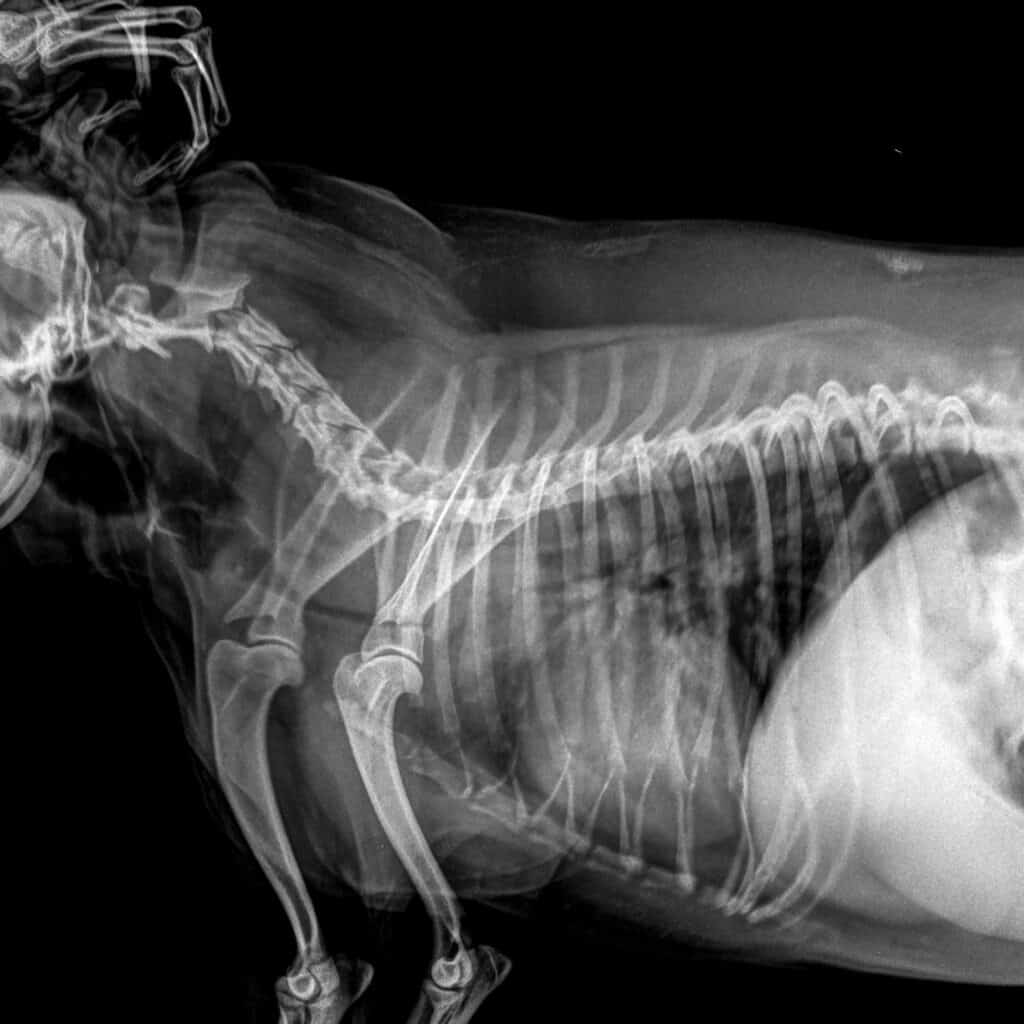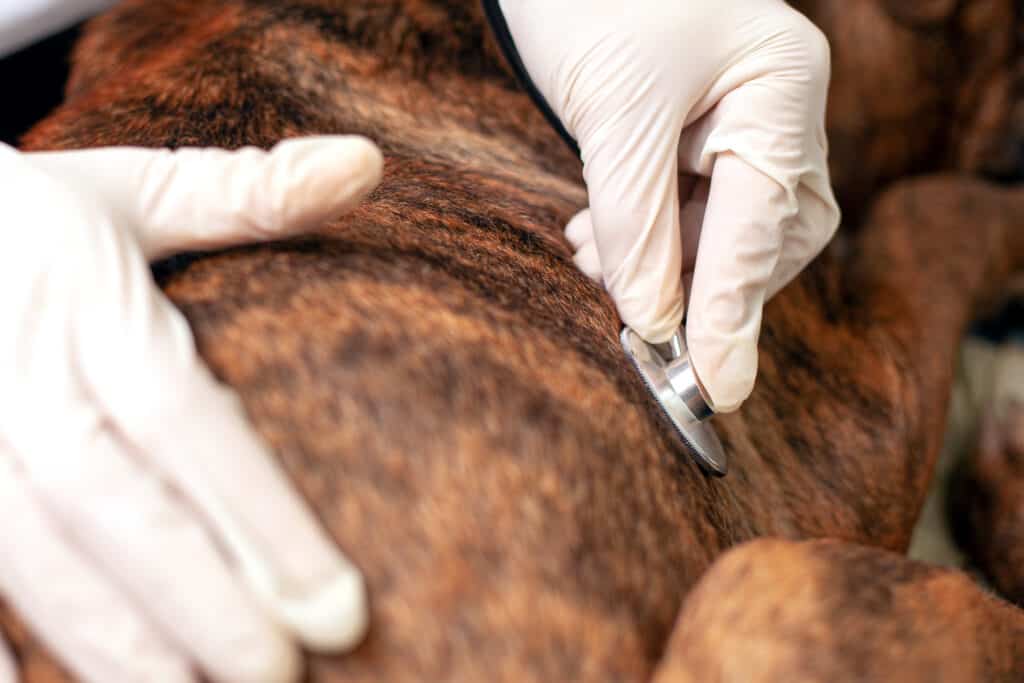Your dog may occasionally cough; this is normal. Allergies or exposure to dust can cause a cough. Most of the time, there isn’t much of a reason to worry. However, if your dog exhibits this behavior frequently or seems unable to stop, they may be ill and need medical attention.
Dogs that have a cough and become lethargic or stop eating may need to be examined. There are several reasons they could be coughing, and it’s always best to know what to look for to prevent some conditions from worsening. Especially since your pet may be suffering from tracheal collapse, pneumonia, kennel cough, canine influenza, or heartworm disease.
If you think your dog has any of these health issues, your vet can help devise a treatment plan. It would be better if you didn’t try any home remedies for coughing until the cause is identified because it could worsen the situation. Get ready to take a few notes if your pup has any issues.
1. Tracheal Collapse
A honking cough brought on by exertion, excitement, or water consumption often points to this diagnosis. Even without a trigger, unproductive coughing can happen. When the cartilages in the trachea get soft, the trachea collapses. When cartilage gets weak, it breaks down and gets wider at the top. The membrane then hangs loosely, blocking the inside of the trachea. Depending on where the collapse occurs, air may not be able to enter or exit the trachea and lungs when breathing.
Signs range from panting, trouble breathing, and a bluish tint to the mucous membranes called cyanosis. The abdominal muscles get tight when they try to breathe through their stomach. Dogs with collapsed tracheas are often overweight but can also be thin. A heart murmur and valvular heart disease are usually found together in older dogs, which have both problems. The diagnosis of tracheal collapse is first made based on history.
The diagnosis is confirmed when a veterinarian can make your pet cough by gently touching the neck. X-rays of the neck and chest show how the trachea changes during the different breathing cycles. If medical treatment doesn’t work, other procedures may be needed to help a dog with tracheal collapse breathe again. When the trachea collapses in the neck area of a young dog, surgery might be an option to fix the problem.

Dog with collapsed trachea.
©Vetlife/Shutterstock.com
2. Pneumonia
Bronchopneumonia affects both the lungs, and the airways are inflamed. Pneumonia is an inflammation of the lungs or lower respiratory tract. Both types of pneumonia are often used interchangeably. In general, lung inflammation is how tissues or cells react when hurt, irritated, or infected. Most dogs with pneumonia get it from a bacterial infection.
A dog can be more likely to get bacterial pneumonia if it has lung disease or condition. Dogs with bacterial pneumonia often have a high fever, trouble breathing, low tolerance for exercise (they get tired quickly), a cough, and a lack of energy. There may also be a runny nose, fast breathing, weight loss, not eating much, and being thirsty.
Some of these symptoms are common and don’t point to one disease in particular. Some of these symptoms can also be caused by diseases of the lungs. Before deciding that your pet has bacterial pneumonia, your vet will do a thorough physical exam and suggest several tests. The results of the tests show which antibiotic treatment will work best. These tests find out what kind of bacteria is causing the infection and what kind of antibiotics can treat it.
3. Kennel Cough
Your dog may have kennel cough (canine infectious tracheobronchitis) if it coughs a lot or makes noises that sound like they’re choking on something. Even though kennel cough sounds terrible, it is usually not a severe illness, and most dogs will get better on their own. The most common sign is a strong, persistent cough. It sounds a lot like a goose squawking. It is different from a sound that some dogs make that sounds like a cough.
This is called a reverse sneeze. Reverse sneezes can be normal in some breeds types of dogs, and they usually mean that the dog has a post-nasal drip or a slight irritation of the throat. Some dogs with kennel cough may also sneeze, have a runny nose, or have discharge from their eyes. If your dog has kennel cough, they’re unlikely to lose their appetite or become less active. It can spread, so keep them away from other animals and talk to your vet.
Most dogs with kennel cough get better after three weeks, but older dogs or dogs with other health problems may need up to six weeks. Because a severe and long-lasting kennel cough can lead to pneumonia, see your vet again if your dog doesn’t get better within the estimated timeframe. Also, if your dog starts breathing quickly, doesn’t eat, or seems lethargic, call your vet immediately. These could be symptoms of other serious problems.

Kennel cough can cause coughing symptoms in your dog.
©Dhanoo Surasarang/Shutterstock.com
4. Canine Influenza
The signs of canine influenza are the same as the signs of the flu in humans: a cough, a runny nose, and a fever. The most common symptom in dogs is a cough that doesn’t get better with antibiotics or cough medicine and lasts for 10 to 21 days. This cough may be wet or dry. It may be linked to a loss of appetite and feeling tired. The CI virus is almost identical to kennel cough and other respiratory illnesses, so it’s hard to differentiate.
CIV is more likely to happen in older dogs and dogs with heart or lung problems. Dogs with short, flat faces, like Boxers, Pugs, and Shih Tzus, are also more likely to get it. The virus that causes dog flu is easy to spread. CIV is spread by respiratory secretions and things that have been contaminated.
After being in contact with the virus, it takes about 2 to 4 days for clinical symptoms to show up. Before the symptoms show up, infected dogs are most likely to spread the disease quickly during this time. Dogs with the virus can still spread it for up to 20 days after they get it. Vaccines help prevent this; the only treatments if they get it are supportive care like fluids and rest.
5. Heart Disease
If a dog with a heart murmur is coughing, it may be a sign that their heart is failing. When a dog has a heart murmur, their heart can get bigger and stop pumping blood to the lungs and the body. Heart failure is characterized by coughing and trouble breathing. This is caused by the fluid building up in the lungs because the enlarged heart pushes on the trachea. Heart failure can also cause tiredness, a loss of appetite that doesn’t go away, a swollen stomach, and gums that are pale or blue.
Since coughing is a sign of many health problems, it is crucial to figure out what’s causing it. Dogs with heart failure need to be checked out immediately and given medicine. Dogs who cough but don’t have heart failure are less likely to need urgent care. A simple and helpful way to tell if a cough is caused by heart failure is to watch the breathing rate while the dog sleeps. Sleeping respiratory rate is the number of times your dog breathes in one minute while asleep.
Researchers have found that dogs with heart failure have higher breathing rates while sleeping than dogs without heart failure. Watch your dog’s breath to find out how fast their breath is while sleeping. Count how many times they breathe in 15 seconds and multiply that number by four to get the number of breaths per minute. If the rate is more than 40 breaths per minute and the dog is coughing and doesn’t want to eat, you should call your vet immediately. You’ll need to make an appointment for an evaluation within 24 to 48 hours.
6. Heartworm Disease
Heartworms live in the heart and cause heartworm disease. Heartworms get their name because they live in the heart, specifically in the pulmonary artery. These worms can also get into other parts of the heart and lungs. Left untreated, they can cause severe lung disease, blockages in the heart valves, and damage to other vital organs. In severely sick dogs, you might see a swollen abdomen caused by fluid accumulation because the heart can’t move blood around as well as it should.
You might also notice a cough or other signs like trouble breathing. Heartworm disease in dogs is called a “silent killer” because your dog might not show any symptoms for months. Heartworms are spread to your dog by mosquitos, which act as vectors and are a big part of how heartworms get there. In the early stages, dogs may not show any symptoms at all.
However, the longer the dog goes without being diagnosed or treated, the more likely symptoms will appear. Young dogs, active dogs, and dogs with health problems might show more obvious signs than other dogs. If you own a dog, you’ve probably talked to your vet about heartworm prevention and know that your dog needs to take medicine. Heartworm medicine can be a tablet that you chew once a month or an injection lasting up to 6 months.

Heart disease is another potential cause of coughing in your dog.
©fukume/Shutterstock.com
Conclusion
While it’s normal for your pup coughs and has no significant coughing fits, it’s good to be aware of all possibilities. If your dog is coughing enough for you to notice throughout the day, keep an eye on them in case their symptoms worsen. Coughing sounds and energy levels can tell you when a dog may need a vet.
In dogs with a known heart issue, coughing can be a bad sign and should be examined immediately. Hopefully, your doggie feels better and doesn’t require anything but extra fluids and rest. If you know anyone who might have a coughing pup, send this post to them, it could save a dog’s life. There are articles linked below that explain other health concerns of dogs that are important.
Up Next:
- Can Dogs Get COVID-19? Symptoms, Risks, and Prevention
- Can Dogs Get Tetanus, What Are The Risks?
- Can Dogs Get Alzheimer’s?
- Can Dogs Get Allergies?
The photo featured at the top of this post is © Anake Seenadee/Shutterstock.com
Ready to discover the top 10 cutest dog breeds in the entire world?
How about the fastest dogs, the largest dogs and those that are -- quite frankly -- just the kindest dogs on the planet? Each day, AZ Animals sends out lists just like this to our thousands of email subscribers. And the best part? It's FREE. Join today by entering your email below.
Sources
- , Available here: https://www.hillspet.com/dog-care/healthcare/why-is-my-dog-is-coughing
- , Available here: https://www.petmd.com/dog/slideshows/8-surprising-causes-dog-coughing
- , Available here: https://www.trudellanimalhealth.com/learn/further-reading/common-causes-coughing-dogs
- , Available here: https://www.dailypaws.com/dogs-puppies/health-care/dog-conditions/dog-coughing
Thank you for reading! Have some feedback for us? Contact the AZ Animals editorial team.






